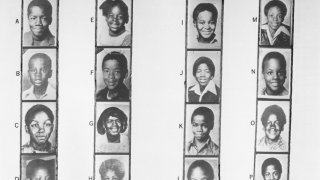
What to Know
- The "Atlanta Child Murders" drew national attention, prompting television news broadcasts to run advertisements asking viewers, "It's 10 p.m. Do you know where your children are?"
- A man named Wayne Williams has long been considered the main suspect, but he’s never been charged in connection with the children’s deaths.
- Mayor Keisha Lance Bottoms said in 2019 that she was hopeful that technological advancements and newly available genetic databases could turn up new information.
A Utah laboratory will examine DNA evidence from a string of killings committed in Atlanta during the 1970s and 1980s, Mayor Keisha Lance Bottoms said.
Bottoms wrote in a tweet on Monday that city investigators were traveling to Salt Lake City to provide “old DNA evidence” to a private lab.
“It is my sincere hope that there will be concrete answers for the families,” she said. The mayor did not identify the laboratory involved.
Get San Diego local news, weather forecasts, sports and lifestyle stories to your inbox. Sign up for NBC San Diego newsletters.
Between 1979-1981, at least 29 Black children and young adults — mostly boys — were killed in the city.
The murders drew national attention, prompting television news broadcasts to run advertisements asking viewers, "It's 10 p.m. Do you know where your children are?"
Wayne Williams has long been considered the main suspect, but he’s never been charged in connection with the children’s deaths. He was sentenced in 1982 to serve two life prison sentences for the murders of two adults.
In March 2019, Bottoms and then-Police Chief Erika Shields announced that evidence from the “Atlanta Child Murders” cases would be reviewed to see if it could be tested further.
The mayor said at the time that she was hopeful that technological advancements and newly available genetic databases could turn up new information.
Bottoms added then that looking back at the evidence is part of her effort to make sure the victims' memories are not forgotten, and “to make sure, in the truest sense of the word, to let the world know that Black lives do matter."
Bottoms also said in July that investigators extended the timeline to 1970-1985 to see whether additional victims were overlooked, news outlets reported.

